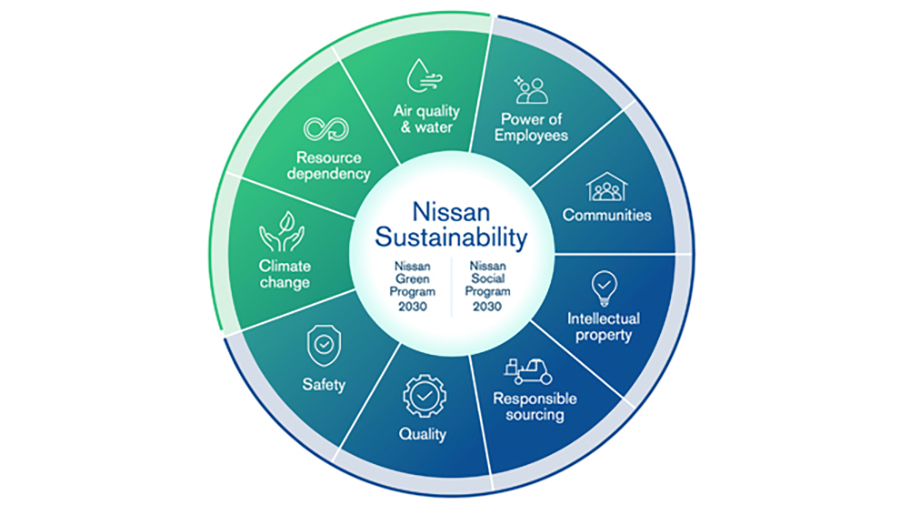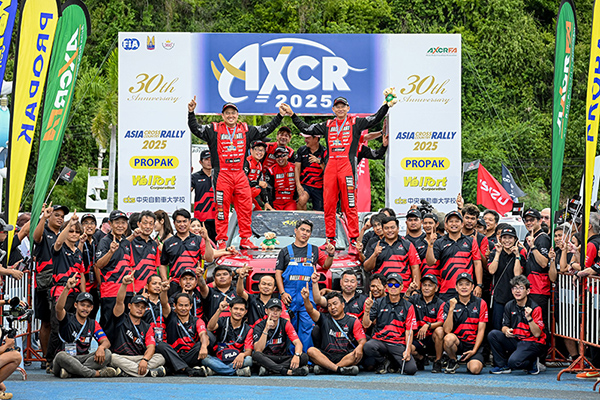
โยโกฮามา ประเทศญี่ปุ่น – บริษัท นิสสัน มอเตอร์ จำกัด เผยแพร่รายงานสำหรับแผนบูรณาการประจำปี 2024 ซึ่งนำเสนอความก้าวหน้าทางธุรกิจของบริษัท ในขณะที่เร่งดำเนินการเพื่อไปสู่วิสัยทัศน์ของบริษัทในระยะยาว Ambition 2030 ด้วยการยึดหลักของการสร้างความยั่งยืน
สำหรับรายงานฉบับแรกไม่เพียงนำเสนอวิสัยทัศน์ กลยุทธ์ แผนธุรกิจ และข้อมูลทางการเงิน ของนิสสันเท่านั้น แต่ยังรวมถึงผลต่อสังคมในระยะกลางถึงระยะยาวอีกด้วย ด้วยความพยายามต่างๆ ของนิสสันที่มุ่งหวังจะสร้างชุมชนที่ปลอดภัย การมีส่วนร่วมในความก้าวหน้าของสังคม และการช่วยฟื้นฟูธรรมชาติ และระบบนิเวศ โครงการริเริ่มของบริษัท ได้แก่ โครงการ Nissan Green Program 2030 (NGP2030) รุ่นที่ 5 รวมถึงการรวบรวมโครงการริเริ่มเชิงกลยุทธ์เพื่อสังคมของนิสสัน โครงการ Nissan Social Program 2030 (NSP2030) ซึ่งทั้งสองโครงการสนับสนุนกลยุทธ์ธุรกิจที่ครอบคลุมของบริษัท รายละเอียดเพิ่มเติมเกี่ยวกับผลลัพธ์ของความพยายามเหล่านี้มีอยู่ในรายงานข้อมูลด้านความยั่งยืนประจำปี 2024 ซึ่งอัปเดตจากรายงานด้าน ESG ที่เผยแพร่เมื่อปี 2023 ที่ผ่านมา
โครงการนิสสัน กรีน 2030
ในปี พ.ศ. 2545 นิสสันได้ประกาศแผนปฏิบัติการด้านสิ่งแวดล้อมระยะกลางแผนแรกภายใต้ชื่อ Nissan Green Program หรือ NGP และนับตั้งแต่นั้นมา บริษัทก็ได้ทำงานเพื่อให้บรรลุปรัชญาด้านสิ่งแวดล้อมที่มีมายาวนาน นั่นคือ “การอยู่ร่วมกันระหว่างผู้คน ยานยนต์ และธรรมชาติ”
สำหรับโครงการ Nissan Green Program 2030 (NGP2030) ระบุถึงการเปลี่ยนแปลงสภาพภูมิอากาศ การพึ่งพาทรัพยากร และคุณภาพอากาศและน้ำ โดยถือเป็นลำดับความสำคัญหลักสามประการที่ต้องเร่งจัดการ โดยนิสสันมุ่งมั่นที่จะปรับตัวให้เข้ากับสถานการณ์ที่มุ่งจำกัดการเพิ่มขึ้นของอุณหภูมิโลกไว้ที่ 1.5 องศาเซลเซียสหรือน้อยกว่า เพื่อมุ่งสู่ความเป็นกลางของคาร์บอน การเปลี่ยนผ่านสู่เศรษฐกิจหมุนเวียน และลดการพึ่งพาและผลกระทบต่อธรรมชาติและระบบนิเวศให้น้อยที่สุด
เป้าหมายความยั่งยืนที่สำคัญภายใต้โครงการ NGP2030 ได้แก่:
- ลดการปล่อยก๊าซ CO2 ตลอดวงจรชีวิตรถยนต์ลง 30%
- ลดการปล่อยก๊าซคาร์บอนไดออกไซด์จากการผลิตต่อคันลง 52%
- ลดการปล่อยก๊าซคาร์บอนไดออกไซด์ต่อคันสำหรับรถรุ่นใหม่ลง 50% ในตลาดหลัก 4 แห่ง ได้แก่ ญี่ปุ่น สหรัฐอเมริกา ยุโรป และจีน นอกจากนี้ นิสสันจะลดการปล่อยก๊าซคาร์บอนไดออกไซด์ประเภทเดียวกันลง 5% ทั่วโลก
- เพิ่มอัตราส่วนชิ้นส่วนที่ใช้วัสดุที่มียั่งยืนในตลาดญี่ปุ่น สหรัฐอเมริกา ยุโรป และจีนเป็น 40%
โครงการ นิสสันโซเชียล 2030
ขณะที่โครงการ นิสสันโซเชียล 2030 (NSP2030) เป็นแผนปฏิบัติการที่ครอบคลุม และเสริมความต่อเนื่องของโครงการริเริ่มเพื่อสังคมต่างๆ ของนิสสัน ทำหน้าที่เป็นรากฐานของแผนธุรกิจ The Arc จะมีส่วนช่วยให้บรรลุเป็นหมายระยะยาว Nissan Ambition 2030 ภายใต้แนวทางที่คำนึงถึงผู้คนเป็นศูนย์กลาง หรือ people-centric approach นิสสันมุ่งมั่นที่จะเติบโตไปพร้อมกับพนักงาน ชุมชน และพันธมิตร และสังคมในวงกว้าง แนวทางแบบองค์รวมนี้จะช่วยให้บริษัทสร้างผลกระทบเชิงบวกต่อสังคม กลายเป็นธุรกิจที่ยั่งยืนอย่างแท้จริง และสร้างโลกที่ดีขึ้นและน่าอยู่สำหรับคนรุ่นต่อๆ ไป
- 6 แกนหลักของ โครงการ นิสสันโซเชียล 2030 ได้แก่ ความปลอดภัย คุณภาพ การจัดหาอย่างมีความรับผิดชอบ ทรัพย์สินทางปัญญา ชุมชน และพลังของพนักงาน บริษัทมีเป้าหมายและแผนปฏิบัติการสำหรับแต่ละหัวข้อจนถึงปี 2030 เพื่อให้แน่ใจว่าคุณค่าทางสังคมจากโครงการจะได้รับการกำหนดและมีความชัดเจน
- นิสสันให้ความสำคัญสูงสุดกับผู้คนมาโดยตลอด โดยคำนึงถึงสิทธิมนุษยชนเป็นหัวใจสำคัญของความพยายาม นี่คือรากฐานของวัฒนธรรมองค์กรของบริษัท และสะท้อนให้เห็นในหกแกนหลักของโครงการ
- นอกจากนี้แกนหลักด้าน “พลังของพนักงาน” ยังครอบคลุมประเด็นด้านความหลากหลาย ความเสมอภาค และการรวมกลุ่มกัน (Diversity, Equity & Inclusion – DEI) รวมถึงสิทธิมนุษยชนของพนักงาน การเรียนรู้และการพัฒนา และสุขภาพและความปลอดภัย มีจุดมุ่งหมายเพื่อทำให้นิสสัน มีสภาพแวดล้อมการทำงานที่พนักงานทุกคนสามารถอยู่ร่วมกันโดยได้รับการสนับสนุน และสามารถเป็นตัวของตัวเองเพื่อบรรลุศักยภาพสูงสุดของแต่ละบุคคลได้ ส่งผลให้เกิดการส่งเสริมวัฒนธรรมองค์กรที่ทั้งบริษัทและพนักงานพัฒนาและก้าวหน้าด้านนวัตกรรมร่วมกันต่อไป นอกจานี้นิสสันมีความมุ่งมั่นเป็นพิเศษในด้าน DEI ที่มีอยู่ โดยมุ่งเน้นไปที่กลุ่มเปราะบาง อาทิ LGBTQ+ ผู้ปกครองที่อยู่ในการทำงาน ผู้ที่มีความหลากหลายทางวัฒนธรรม และอื่นๆ โดยบริษัทพร้อมสนับสนุนกิจกรรมที่ขับเคลื่อนโดยพนักงานเพื่อสถานที่ทำงานที่เปิดกว้างและมีนวัตกรรมมากขึ้น
ความยั่งยืนที่นิสสัน
โครงการนิสสัน กรีน 2030 (NGP2030) และ โครงการ นิสสันโซเชียล 2030 (NSP2030) เป็นองค์ประกอบสำคัญของแผนธุรกิจใหม่ของนิสสัน The Arc ซึ่งทำหน้าที่เป็นสะพานเชื่อมสู่วิสัยทัศน์ระยะยาวของบริษัทที่รู้จักภายใต้ชื่อ Ambition 2030 โจจิ ทากาวะ ประธานเจ้าหน้าที่ฝ่ายความยั่งยืนของ Nissan (Joji Tagawa – Chief Sustainability Officer) กล่าวว่า “เพื่อให้มั่นใจว่าความก้าวหน้าของเรา วิสัยทัศน์ระยะยาวของเรานั้นครอบคลุมและเป็นประโยชน์ต่อพันธมิตรและผู้มีส่วนได้ส่วนเสียทั้งหมดของเรา สิ่งสำคัญคือเราต้องร่วมมือกับพวกเขาเพื่อแลกเปลี่ยนความคิดเห็นและนำความคิดเห็นมาพัฒนา ด้วยความพยายามของบริษัท เราต้องร่วมกันเตรียมความพร้อมสำหรับอนาคตอย่างต่อเนื่องเพื่อให้เราสามารถทำให้บริษัทมีความยั่งยืนและมีส่วนร่วมในสังคมที่ยั่งยืนในท้ายที่สุด ซึ่งทั้งหมดล้วนสอดคล้องกับวัตถุประสงค์หลักของนิสสัน นั่นคือ การขับเคลื่อนนวัตกรรมเพื่อยกระดับชีวิตของผู้คน”
นิสสันจะยังคงเดินหน้าพัฒนาความยั่งยืนต่อไปในรูปแบบต่างๆที่ทำได้และมีความเหมาะสมที่สุด โดยยึดถือเป็นหลักสำคัญของบริษัท บนเส้นทางที่จะนำไปสู่โลกที่สะอาดขึ้น ปลอดภัยยิ่งขึ้น และอยู่ร่วมกันมากขึ้น
Nissan unveils inaugural Integrated Report and new sustainability plan
Advancing environmental and social programs to achieve The Arc business plan and Nissan’s long-term vision Ambition 2030
YOKOHAMA, Japan – Nissan Motor Co., Ltd. today published its Integrated Report 2024, which showcases the company’s business progression as it accelerates toward its Ambition 2030 vision, always with sustainability at its core.
The inaugural report presents not only Nissan’s vision, strategies, business plans, and financial information, but also its mid- to long-term impact on society. Through various efforts, Nissan aims to create safe and secure communities, contribute to the advancement of society, and help restore nature and ecosystems. The company’s initiatives include the fifth-generation Nissan Green Program 2030 (NGP2030) as well as a strategic compilation of Nissan’s social initiatives, the Nissan Social Program 2030 (NSP2030) – both of which support the company’s overarching business strategy. Further detail on the results of these efforts is provided in the Sustainability data book 2024, updated from the ESG data book 2023 published last year.
Nissan Green Program 2030
In 2002, Nissan announced its first mid-term environmental action plan, Nissan Green Program (NGP), and has since worked to achieve its longstanding environmental philosophy of “a symbiosis of people, vehicles, and nature.”
NGP2030 identifies climate change, resource dependency, and air quality and water as three key material priorities to address. Nissan strives to adapt to a scenario limiting global temperature increase to 1.5 degrees Celsius or less to move toward carbon neutrality, transitioning to a circular economy, and minimizing dependence and impact on nature and ecosystems.
Key sustainability targets in NGP2030 include:
- Reducing per-vehicle lifecycle CO2[1] emissions by 30%[2]
- Reducing per-vehicle manufacturing CO2 emissions by 52%2
- Reducing per-vehicle driving CO2 emissions for new models by 50%2 in four major markets: Japan, the S., Europe, and China. In addition, Nissan will reduce the same category of CO2 emissions by 32.5%2 globally
- Increasing sustainable material[3] ratio in Japan, the U.S., Europe, and China to 40%
Nissan Social Program 2030
NSP2030 is a comprehensive action plan and an enhanced continuation of Nissan’s social initiatives, serving as a foundation of The Arc and contributing to achieving Nissan Ambition 2030. With a people-centric approach, Nissan is committed to growing together with its employees, communities, partners, and broader society. This holistic approach will help the company make a positive impact on society, become a truly sustainable business, and create a better world for future generations.
- The six pillars of the NSP2030 are safety, quality, responsible sourcing, intellectual property, communities, and power of employees. The company has goals and action plans for each pillar toward 2030, making sure the social value from the program is defined and clear.
- Nissan’s top priority has always been people, with respect for human rights at the heart of its endeavors. This is the foundation of the company’s corporate culture and is reflected in the six pillars of the program.
- The ‘power of employees’ pillar encompasses DEI, employee human rights, learning and development, and health and safety. It is intended to make Nissan a rewarding work environment where all employees feel empowered, supported, and able to be their authentic selves and achieve their full potential. This results in fostering a corporate culture in which both the company and its employees evolve and advance innovation further together. Nissan is particularly committed to DEI, with existing employee resource groups (ERGs) focusing on LGBTQ+, working parents, multiculturalism, and more. These ERGs champion employee-driven activities for a more open, innovative workplace.
Sustainability at Nissan
The NGP2030 and NSP2030 are essential elements of Nissan’s new business plan, The Arc, which serves as a bridge to the company’s long-term vision Ambition 2030. Joji Tagawa, chief sustainability officer at Nissan, says, “In order to ensure that our progress towards our long-term vision is inclusive of and benefits all of our partners and stakeholders, it is pivotal that we collaborate with them to exchange ideas and opinions and evolve our efforts. Together, we must steadily prepare for the future so we can make the company itself sustainable and, ultimately, contribute to a sustainable society. This is in line with Nissan’s corporate purpose: Driving innovation to enrich people’s lives.”
Nissan will continue to advance sustainability in the most applicable and suitable ways, centering it as the cornerstone of the company, on the path to achieving a cleaner, safer, and more inclusive world.
[1] The lifecycle CO2 covers all stages from raw material mining, manufacturing, transportation, product use and disposal, and is calculated by procurement, production, logistics, offices, sales companies and products.
2 The 2030 targets are referencing 2018 as a base year.
3 Includes materials that have not been newly mined (recycled and bio-derived materials) and circular materials that meet sustainability requirements.







